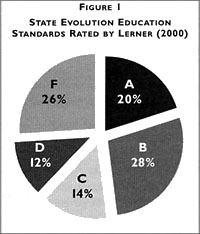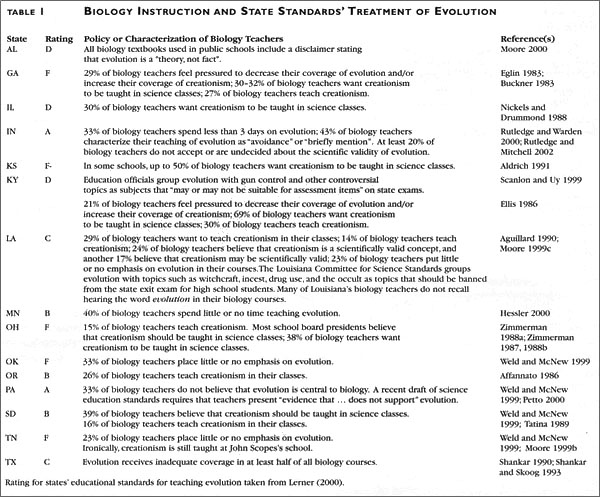State standards for teaching evolution are important, for they are presumably the basis for what teachers teach and students learn, and thereby establish the foundation for states' desired educational outcomes. However, a more important factor that influences the quality of evolution education is not discussed in Lerner's report — namely, the evolution-related attitudes and actions of biology teachers. How do states' standards for teaching evolution relate to the acceptance or rejection of evolution by biology teachers?
Table 1 summarizes how the quality of states' standards for teaching evolution relate to the evolution-related attitudes of biology teachers. In states having low standards for teaching evolution (for example, grades of D, F, or F-, such as in Illinois, Kentucky, Ohio, Georgia, and Kansas), relatively large percentages of biology teachers believe that creationism should be taught in science classes in public schools. In some of these states, significant percentages of biology teachers actually teach creationism in their classes, despite the fact that the US Supreme Court's decision in Edwards v Aguillard established that it is unconstitutional (Moore 2000). The presence of low standards for teaching evolution also correlates with biology teachers' lack of emphasis on evolution (for example, Tennessee and Oklahoma) and anti-science policies such as the presence of anti-evolution disclaimers in biology textbooks (as in Alabama). As Lerner (2000) noted, although low standards for teaching evolution are concentrated in the Bible Belt, they also occur elsewhere (for example, Ohio and Illinois).
 States having satisfactory standards for teaching evolution are not much different. For example, in Louisiana (see Aguillard 1999, Moore 1999c, and references therein) where standards are "satisfactory", over 40% of biology teachers believe that creationism is or may be scientifically valid, and they either do or want to teach creationism in their classes (see Table 1). Nearly another quarter of biology teachers avoid or play down the topic, and many of the state's biology teachers do not recall hearing the word evolution in their college biology courses. Furthermore, the Louisiana Committee for Science Standards treats evolution as it does witchcraft, the occult, and other fringe ideas that are banned from the state's exit exams.
States having satisfactory standards for teaching evolution are not much different. For example, in Louisiana (see Aguillard 1999, Moore 1999c, and references therein) where standards are "satisfactory", over 40% of biology teachers believe that creationism is or may be scientifically valid, and they either do or want to teach creationism in their classes (see Table 1). Nearly another quarter of biology teachers avoid or play down the topic, and many of the state's biology teachers do not recall hearing the word evolution in their college biology courses. Furthermore, the Louisiana Committee for Science Standards treats evolution as it does witchcraft, the occult, and other fringe ideas that are banned from the state's exit exams.
In Texas, another state having "satisfactory" standards for teaching evolution, evolution receives inadequate coverage in at least half of all biology courses (Shankar 1990; Shankar and Skoog 1993). Thus, the presence of "satisfactory" guidelines for teaching evolution does not mean that large percentages of biology teachers do not endorse (and sometimes teach) creationism in their courses. What about states that have "good" (for example, Minnesota and South Dakota) or "excellent" or "very good" (for example, Indiana and Pennsylvania) standards for teaching evolution? Although these states have the nation's highest standards for teaching evolution, relatively large percentages of their biology teachers believe that creationism should be included in science classes, spend little time teaching evolution, and question the scientific validity of evolution (Weld and McNew 1999; Rutledge and Warden 2000).
Do Standards Matter?
Although standards for teaching science have been touted as being important for the reform of science education, the studies summarized in Table 1 show that standards often mean little in biology classrooms. Indeed, prior research shows that relatively large percentages of biology teachers throughout the United States continue to endorse creationism, question evolution, and even teach creationism in their courses, regardless of their state's standards for evolution education (see Table 1 and references therein). As Don Aguillard has noted, creationism is alive and well in biology classrooms (Moore 1999c).

Evolution-related instruction is influenced by educational standards and a variety of other factors such as textbooks, the curriculum, and tests. However, the most important factor in student learning is the teacher. Throughout the United States, many biology teachers avoid (or do a poor job of) teaching evolution, endorse creationism, or, in some cases, teach creationism. One important consequence of such behavior by teachers is that the biology education of "over a quarter — and perhaps as many as half — of the nation's high school students is shaped by creationist influence — in spite of the overwhelming opposition of the nation's scientific, educational, intellectual, and media establishments" (Eve and Harrold 1991).
The endorsement of creationism by relatively large percentages of biology teachers is not a new phenomenon. For example, more than 60 years ago biologist Oscar Riddle (1941) reported the popularity of creationism among biology teachers and noted that fewer than half of high school biology teachers taught evolution. Almost two decades later Herman Muller (1959) again observed the popularity of creationism among biology teachers and noted that biology teaching was dominated by "antiquated religious traditions".
When the National Association of Biology Teachers (NABT) established its "Fund for Freedom in Science Teaching" in the 1970s to combat the anti-science campaigns of creationists, many members of NABT were outraged. According to Nelkin (1982: 158), "letters poured into" NABT's national office decrying "vicious scientific attacks on the creationists" and attempts to "promote atheism and agnosticism in the schools". To accommodate its many creationist members, NABT sponsored a well-attended session about creationism at its annual meeting and published several articles promoting creationism in its journal, The American Biology Teacher (for example, Gish 1970, 1973; Moore 1973; also see Nelkin 1982). Today, many biology teachers continue to proclaim their endorsement of creationism and rejection of evolution (Harp 1999; Scanlon and Uy 1999; Wolfson 1999; Moore 1999a, 2000).
Standards are not altogether useless in the fight for evolution education. Standards for teaching evolution can provide important support for biology teachers facing protests from creationist students, parents, and administrators who want creationism to be taught (or evolution not to be taught) in biology classes. In addition to state standards, numerous science education organizations (for example, the American Association for the Advancement of Science [1989], the National Association of Biology Teachers [1997], the National Academy of Sciences [1998], the National Research Council [1985], and the National Science Teachers Association [1997]) have issued standards and policy statements urging biology teachers to make evolution a central theme in their classes.
However, states' and science education organizations' standards for teaching evolution have not changed the fact that evolution is often taught poorly — or not at all — in biology classes. As a result, the public (including our former students) overwhelmingly endorses creationism over evolution (for example, Gallup and Newport 1991; Moore 2000; Greenwood and North 1999; Sonderstrom 2000; Finn and Kanstoroom 2000). Throughout the country, large percentages of biology teachers have ignored these standards. If we are to do a better job of teaching evolution — and if our students (future citizens, taxpayers, and political leaders) are going to learn it better — we must do more than establish standards that are ignored.
